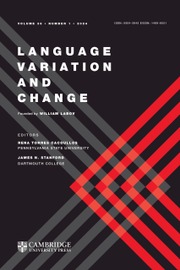Article contents
Principles of variationism for disambiguating language contact phenomena: The case of lone Spanish nouns in Catalan discourse
Published online by Cambridge University Press: 07 February 2001
Abstract
Using the variationist comparative method, the status of ambiguous lone Spanish-origin nouns in Catalan discourse is determined by analyzing their distribution and conditioning and by comparing them to their counterparts in unmixed Spanish or in multiple-word code-switches. Some areas of the nominal grammar have been selected for contrastive purposes (determination, complementation, gender, number) because they represent sites of coincidence as well as conflict between the two languages in contact, Spanish and Catalan. The main conclusion of this research is that Spanish-origin nouns in an otherwise Catalan context present grammatical variability similar to that of Catalan nouns, and that they behave differently from Spanish nouns in a monolingual context. In short, the grammar of these nouns is Catalan, and their categorial status is that of loanwords and not that of code-switches.
- Type
- Research Article
- Information
- Copyright
- © 2000 Cambridge University Press
- 8
- Cited by


